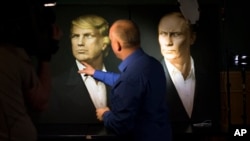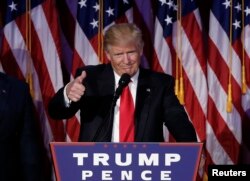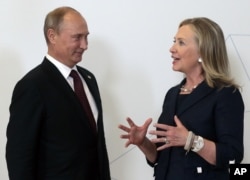Russia, by all indications, got the outcome in the U.S. presidential election it desired.
The Russians were accused of attempting to influence the election in favor of the winner, Donald Trump, and were formally blamed by the United States for a political hacking attack. President Vladimir Putin recently denied both accusations.
In a morning-after telegram to Trump, the Russian leader said he hopes to work together to lift the bilateral relationship out of its current crisis, resolve other international issues, and find effective responses to global security challenges.
Key to that will be the team the president-elect assembles for national security and foreign policy.
Some of those said to be under consideration, such as U.S. senators Jeff Sessions and Bob Corker, both Republicans, have a history of favoring a confrontational stance with Moscow.
“I don’t think there’s a danger of putting people who are soft or naïve into such positions as secretary of defense or secretary of state,” said Rutgers University history professor David Foglesong.
Still, he noted that Sessions and Corker have “changed their tune a bit” since joining Trump’s national security advisory team and began following Trump’s line about the desirability of working together with Russia.
It is unknown whether Trump, with no political, diplomatic or military experience, has any intention of listening to such advisers, who were largely ignored during the campaign.
“Whether that will change or not once he becomes president we really have no way of knowing at this point,” said James Goldgeier, dean of the School of International Service at American University.
Foglesong, speaking to VOA on Wednesday, recommends the new administration break with the Obama White House’s approach of vilifying Putin and engage Moscow while appointing pragmatists, not ideologues, to key foreign policy posts. He agrees with Goldgeier that the biggest unknown for the bilateral relationship is the president-elect himself, who has scant knowledge about Putin.
“Trump is personally so ignorant about Russia that he might be surprised about ways Russia and American interests are not going to align on everything around the world,” Goldgeier told VOA.
If Trump decides to relax sanctions and doesn’t reassure America’s European allies, “Putin may get all the things he’s always hoped for from United States – which is a United States that’s less of a leader in Europe and leaves Russia more free to dominate its immediate neighborhood,” added Goldgeier, a former director for Russian affairs on the National Security Council staff.
The chances of reconciliation with Russia, however, probably would have been less likely if the election had been won by Secretary Clinton, whose rhetoric over the years about Putin included her saying “he doesn’t have a soul.”
Russian state media accused Clinton and her supporters of engaging in scare tactics about Russia to get her elected. A correspondent on the RT channel said her camp had “gone so far that some wonder if it could prepare the ground for a major confrontation between Russia and the United States."
During Clinton’s term as Secretary of State relations with Moscow vastly improved for a brief period (the much-touted 2009 “reset”) but spiraled downward following Putin’s re-election as president in 2012 following a four-year hiatus.
Russia watchers note historically there have been quick and dramatic shifts in Washington-Moscow relations.
Repulsion in the United States during the early 20th century about brutal Soviet dictator Josef Stalin quickly softened after World War Two began and the U.S. and Soviet Union allied to defeat the Axis powers. However, ties chilled again in the Cold War era.
“A vigorous presidential leadership on a new course in Russian-American relations could bring along much of the national security establishment and much of the major American mainstream mass media,” noted Rutgers’ Foglesong, who has authored several books about the history of the relationship.












